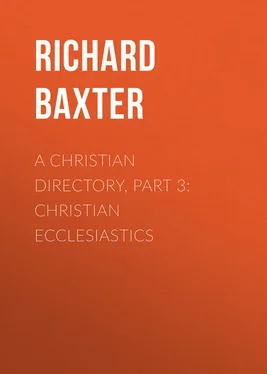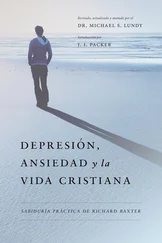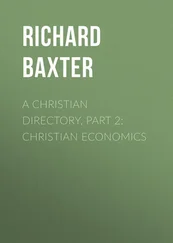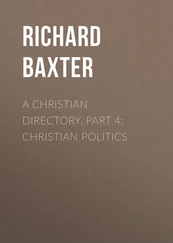Richard Baxter - A Christian Directory, Part 3 - Christian Ecclesiastics
Здесь есть возможность читать онлайн «Richard Baxter - A Christian Directory, Part 3 - Christian Ecclesiastics» — ознакомительный отрывок электронной книги совершенно бесплатно, а после прочтения отрывка купить полную версию. В некоторых случаях можно слушать аудио, скачать через торрент в формате fb2 и присутствует краткое содержание. Жанр: foreign_antique, foreign_prose, на английском языке. Описание произведения, (предисловие) а так же отзывы посетителей доступны на портале библиотеки ЛибКат.
- Название:A Christian Directory, Part 3: Christian Ecclesiastics
- Автор:
- Жанр:
- Год:неизвестен
- ISBN:нет данных
- Рейтинг книги:3 / 5. Голосов: 1
-
Избранное:Добавить в избранное
- Отзывы:
-
Ваша оценка:
- 60
- 1
- 2
- 3
- 4
- 5
A Christian Directory, Part 3: Christian Ecclesiastics: краткое содержание, описание и аннотация
Предлагаем к чтению аннотацию, описание, краткое содержание или предисловие (зависит от того, что написал сам автор книги «A Christian Directory, Part 3: Christian Ecclesiastics»). Если вы не нашли необходимую информацию о книге — напишите в комментариях, мы постараемся отыскать её.
A Christian Directory, Part 3: Christian Ecclesiastics — читать онлайн ознакомительный отрывок
Ниже представлен текст книги, разбитый по страницам. Система сохранения места последней прочитанной страницы, позволяет с удобством читать онлайн бесплатно книгу «A Christian Directory, Part 3: Christian Ecclesiastics», без необходимости каждый раз заново искать на чём Вы остановились. Поставьте закладку, и сможете в любой момент перейти на страницу, на которой закончили чтение.
Интервал:
Закладка:
9. You must use him as your leader or champion against all heretics, infidels, and subtle adversaries of the truth, with whom you are unable to contend yourselves, that your bishops may clear up and defend the cause of Christ and righteousness, and by irresistible evidence, stop the mouths of all gainsayers. 106 106 I hope all this will tell you what a bishop indeed is.
It is for your own benefit, and not for theirs, that you are required in all these works of their office to use them and readily obey them. And what hurt can it do you to obey them in any of these?
Direct. III. Understand how it is that Christ doth authorize and send forth his ministers, lest wolves and deceivers should either obtrude themselves upon you as your lawful pastors, or should alienate you from those that God hath set over you, by puzzling you in subtle questioning or disputing against their call. Not only Paul's warnings, Acts xx. 30, and 2 Tim. iii. 6, but lamentable experience, telleth us what an eager desire there is in proud and self-conceited men, to obtrude themselves as teachers and pastors on the churches, to creep into houses and lead people captive, and draw away disciples after them, and say (and perhaps think) that others are deceivers, and none are the true teachers indeed but they. And the first part of the art and work of wolves, is to separate you from your pastors, and catch up the stragglers that are thus separated. The malice, and slanders, and lies, and railing of hirelings and deceivers, and all the powers of hell, are principally poured out on the faithful pastors and leaders of the flocks. The principal work of the Jesuits against you, is to make you believe that your pastors are no true pastors, but uncalled private persons, and mere usurpers: and the reason must be, because they have not an ordination of bishops successively from the apostles without interruption. 107 107 Grot. de Imp. p. 273. Pastorum est ordinare pastores. Neque id officium eis competit, qua hujus aut illius ecclesiæ pastores sunt, sed qua ministri ecclesiæ catholicæ.
I confess if our interruptions had been half as lamentable as theirs, (by their schisms, and variety of popes at once; and popes accused, or condemned by general councils, for heretics; and their variety of ways of electing popes, and their incapacities by simony, usurpation, &c.) I should think at least that our ancestors had cause to have questioned the calling of some that were then over them. But I will help you in a few words to discern the juggling of these deceivers, by showing you the truth concerning the way of Christ's giving his commission to the ministers that are truly called, and the needlessness of the proof of an uninterrupted succession of regular ordination, to your reception of your pastors and their ministrations.
The ministerial commission is contained in, and conveyed by, the law of Christ, which is the charter of the church, and every true bishop or pastor hath his power from Christ, and not at all from the efficient conveyance of any mortal man: even as kings have their power not from man, but from God himself; but with this difference, that in the church Christ hath immediately determined of the species of church offices, but in the civil government, only of the genus (absolutely and immediately). 108 108 See in Grotius de Imper. sum. potest. p. 269. The necessary distinction of, 1. Ipsa facultas prædicandi sacramenta et claves administrandi, quod Mandatum vocat. 2. Applicatio hujus facultatis ad certam personam, viz. Ordinatio. 3. Applicatio hujus personæ ad certum cœtum et locum, viz. Electio. 4. Illud quo certa persona in certo loco ministerium suum exercet publico præsidio ac publica authoritate, viz. Confirmatio, p. 273. Constat muneris institutionem a Deo esse; ordinationem a pastoribus, confirmationem publicam a summa potestate. So that the doubt is only about election. Which yet must be differenced from consent.
You cannot have a plainer illustration, than by considering how mayors, and bailiffs, and constables are annually made in corporations: the king by his charter saith, that every year at a certain time the free-men or burgesses shall meet, and choose one to be their mayor, and the steward or town-clerk shall give him his oath, and thus or thus he shall be invested in his place, and this shall be his power and work, and no other. So the king by his law appointeth that constables and churchwardens shall be chosen in every parish. Now let our two questions be here decided: 1. Who is it that giveth these officers their power? 2. Whether an uninterrupted succession of such officers through all generations since the enacting of that law, be necessary to the validity of the present officer's authority? To the first, It is certain that it is the king by his law or charter that giveth the officers their power; and that the corporations and parishes do not give it them by electing or investing them; yea, though the king hath made such election and investiture to be in a sort his instrument in the conveying it, it is but as the opening of the door to let them in, sine quo non ; but it doth not make the instruments to be at all the givers of the power, nor were they the receiving or containing mediate causes of it. The king never gave them the power which the officers receive, either to use, or to give; but only makes the electors his instruments to determine of the person that shall receive the power immediately from the law or charter; and the investers he maketh his instruments of solemnizing the tradition and admission: which if the law or charter make absolutely necessary ad esse officii , it will be so; but if it make it necessary only ad melius esse , or but for order and regular admittance when no necessity hindereth it, the necessity will be no more. And to the second question, It is plain that the law, which is the fundamentum juris , remaining still the same, if a parish omit for divers years to choose any constable or churchwarden, yet the next time they do choose one according to law, the law doth authorize him, nevertheless, though there was an interruption or vacancy so long; and so in corporations (unless the law or charter say the contrary): so is it in the present case. 1. It is the established law of Christ, which describeth the office, determineth of the degree and kind of power, and granteth or conveyeth it, when the person is determined of by the electors and ordainers, though by ordination the delivery and admission is regularly to be solemnized; which actions are of just so much necessity as that law hath made them, and no more. 2. And if there were never so long an interruption or vacancy, he that afterward entereth lawfully, so as to want nothing which the law of Christ hath made necessary to the being of the office, doth receive his power nevertheless immediately from the law of Christ. And Bellarmine himself saith, that it is not necessary to the people, and to the validity of sacraments and offices to them, to know that their pastors be truly called or ordained: and if it be not necessary to the validity of sacraments, it is not necessary to the validity of ordination. And W. Johnson 109 109 See my Disput. with him of the Successive Visibility of the Church, p. 336.
confesseth to me that consecration is not absolutely necessary ad esse officii to the pope himself: no, nor any one sort of electors in his election, p. 133. And in his Repl. Term. Expl. p. 45, he saith, Neither papal nor episcopal jurisdiction (as all the learned know) depends of episcopal or papal ordination: nor was there ever interruptions of successions in episcopal jurisdiction in any see, for want of that alone, that is necessary for consecrating others validly, and not for jurisdiction over them. You see then how little sincerity is in these men's disputations, when they would persuade you to reject your lawful pastors as no true ministers of Christ, for want of their ordination or succession.
Интервал:
Закладка:
Похожие книги на «A Christian Directory, Part 3: Christian Ecclesiastics»
Представляем Вашему вниманию похожие книги на «A Christian Directory, Part 3: Christian Ecclesiastics» списком для выбора. Мы отобрали схожую по названию и смыслу литературу в надежде предоставить читателям больше вариантов отыскать новые, интересные, ещё непрочитанные произведения.
Обсуждение, отзывы о книге «A Christian Directory, Part 3: Christian Ecclesiastics» и просто собственные мнения читателей. Оставьте ваши комментарии, напишите, что Вы думаете о произведении, его смысле или главных героях. Укажите что конкретно понравилось, а что нет, и почему Вы так считаете.












